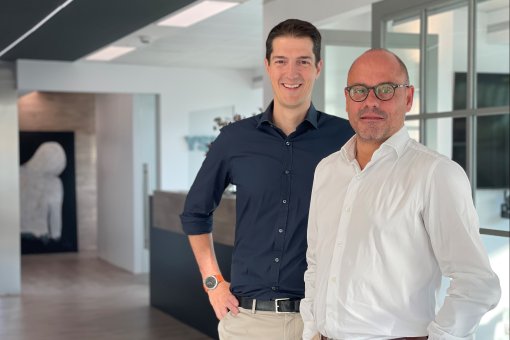Images
Contact

Yesterday IRB Barcelona’s Board of Trustees appointed the renowned scientist as director of the Institute, a position that he will take up on 1 May.
Francesc Posas succeeds Joan J. Guinovart, the director and founder of the Institute.
Francesc Posas Garriga, an internationally acknowledged researcher in the field of cell biology and full professor of the Universitat Pompeu Fabra (UPF), is to take up the position of director of the Institute for Research in Biomedicine (IRB Barcelona). As of 1 May, he will succeed Joan J. Guinovart, who was a key figure in setting up the Institute in October 2005 and who has served as director since.
The international selection process for IRB Barcelona’s new director has been coordinated by the CERCA Institute (Catalan Research Centres), an organisation run by the Catalan Government. Seventeen applications from six countries were received. IRB Barcelona’s External Advisory Board, which is chaired by researcher Joan Massagué and formed by researchers from centres around the world, was charged with conducting the interviews and putting forward the candidate to the Board of Trustees, which approved the appointment yesterday.
“It is an honour to be offered the opportunity to head one of the best research centres in the country. I intend to channel my experience and efforts into strengthening the research on the fundamental causes of diseases being conducted by outstanding scientists. With the help of all the members of the Institute, we will firmly position IRB Barcelona on the map of international research centres of reference. This will require the involvement and cooperation of the IRB Barcelona community, and institutions, centres and universities in our setting. To ensure that this goal is accomplished, we will continue to foster the training of young scientists, promote technology transfer and seek the involvement of society,” said Francesc Posas.
Francesc Posas will be moving his Cell Signalling Laboratory to IRB Barcelona premises at the Barcelona Science Park. He will continue his projects focused on the molecular bases that determine how cells respond to changes in their environment and the involvement of this cell behaviour in diseases such as cancer and inflammatory conditions. His lab is expected to be up and running at the end of the summer.
Francesc Posas’ career path
Posas (Born in Sant Feliu de Codines -Barcelona-, 1968) received a PhD in Biochemistry and Molecular Biology from the Universitat Autònoma de Barcelona in 1995, and shortly after he took up a postdoctoral research position at Harvard University in the US, until 1998. Since 1999 he has been at UPF.
He is a full professor in the Department of Experimental Sciences and Health at UPF, which he managed for six years (2007–2013). He went on to take up the position of Vice-rector for Science Policy (2013–2015), and until now has served as Commissioner for Scientific Strategy at the same university. Since 1999, together with Dr. E. De Nadal, he has headed the Cell Signalling Research Group, which currently has 20 members. Posas has published more than scientific 100 articles, some of which have appeared international journals of reference such as Nature, Science and Cell.
The group’s research projects have received funding from both national and international agencies, including the European Research Council (ERC), the Plan Nacional (MINECO), the Catalan Government, the European Molecular Biology Organization (EMBO), the European Union (FP6, FP7), and the European Science Foundation-EURYI, among others. His lab is also supported by the Botín Foundation.
Dr. Posas has received numerous awards and distinctions, including the Catalan Government’s Young Investigator Award (2001) and the EMBO Young Investigator Award (2000). Elected a member of EMBO in 2006, he has been an ICREA Academia Researcher on two occasions (2009–2013 and 2014–2018) and has been given a “Carmen y Severo Ochoa” Prize in Molecular Biology (2011).
IRB Barcelona is devoted to conducting research of excellence in biomedicine and to transferring results to clinical practice, thus improving people’s quality of life, while simultaneously promoting the training of outstanding researchers, technology transfer, and public communication of science. Created in 2005 by the Generalitat de Catalunya (Catalan Government) and University of Barcelona, IRB Barcelona is a “Severo Ochoa” Centre of Excellence, a seal that was awarded in 2011. Its 25 laboratories and seven core facilities address basic questions in biology and are orientated to diseases such as cancer, metastasis, diabetes, and rare conditions. Located at the Barcelona Science Park, IRB Barcelona is an international centre that hosts 400 employees and 32 nationalities. IRB Barcelona forms part of the Barcelona Institute of Science and Technology (BIST) and the Xarxa de Centres de Recerca de Catalunya (CERCA).
About IRB Barcelona
The Institute for Research in Biomedicine (IRB Barcelona) pursues a society free of disease. To this end, it conducts multidisciplinary research of excellence to cure cancer and other diseases linked to ageing. It establishes technology transfer agreements with the pharmaceutical industry and major hospitals to bring research results closer to society, and organises a range of science outreach activities to engage the public in an open dialogue. IRB Barcelona is an international centre that hosts 400 researchers and more than 30 nationalities. Recognised as a Severo Ochoa Centre of Excellence since 2011, IRB Barcelona is a CERCA centre and member of the Barcelona Institute of Science and Technology (BIST).




